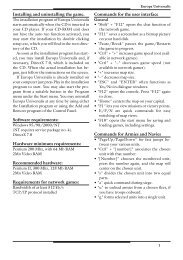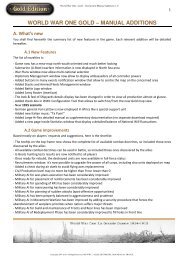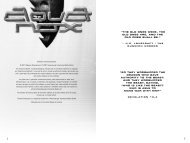You also want an ePaper? Increase the reach of your titles
YUMPU automatically turns print PDFs into web optimized ePapers that Google loves.
never be allowed to become despondent; so victories must be<br />
exaggerated and defeats, if not concealed, at any rate minimized, and the<br />
stimulus of indignation, horror, and hatred must be assiduously and<br />
continuously pumped into the public mind by means of propaganda.<br />
Conditions: not before 1915.<br />
Difficulty: die roll 2+.<br />
Enter in play: Events phase, any turn.<br />
Option #1: (historical choice) Social unrests bonus – For the incoming 6<br />
turns, the target nation will benefit from a -1 bonus to the die rolls on all<br />
Social unrests tests: strikes, mutinies and rebellions.<br />
Option #2: Nation Stability bonus – For the incoming 6 turns, the target<br />
nation will benefit from a +1 bonus to the die rolls on all Stability tests.<br />
Option #3: Parliament Mood bonus – The attitude of the target nation’s<br />
Parliament is moved by 1 space towards Sacred Union.<br />
Notes: once successfully in play, the event is discarded and can be later<br />
reshuffled in the deck.<br />
National Will<br />
Description: This event will give your nation an immediate improvement of<br />
your National Will. Such improvement will be determined randomly.<br />
Historical notes: The deprivations of the war were manifold and both<br />
soldiers at the front and people in the homeland considerably suffered from<br />
them. Hoping for a soon victory and their men and sons returning from the<br />
front, mothers and women worked even harder in the industry.<br />
Conditions: automatic.<br />
Difficulty: die roll 2+.<br />
Enter in play: Events phase, any turn.<br />
Option #1: (historical choice) National Will bonus – The target nation will<br />
receive an immediate random National Morale bonus, spanning from<br />
1 to 6.<br />
Notes: once successfully in play, the event is discarded and can be later<br />
reshuffled in the deck.<br />
Sixte of Bourbon-Parme/De Witt<br />
Description: This event will give you a big bonus in negotiating a separate<br />
peace with Austria, for the Entente, or Russia, for the Central Powers.<br />
Historical notes: Prince Sixtus of Bourbon-Parma (given names: Sixtus<br />
Ferdinand Maria Ignazio Alfred Robert; Wartegg, Switzerland, August 1,<br />
1886 – Paris, March 14, 1934) was a Prince of the Duchy of Parma, a<br />
Belgian officer in the First World War, and the central figure in the Sixtus<br />
Affair. His sister Zeta of Bourbon-Parma was married to Emperor Charles I<br />
of Austria. In 1917, Prince Charles sent his brother-in-law Sixtus to France<br />
to secretly enter into peace negotiations with France. This was not known<br />
to his ally Germany, but when the news of the overture leaked in April 1918,<br />
Charles I denied any involvement. However, the French prime minister<br />
published the letters sent by Charles I, what led to a even more dependent<br />
position of Austria with respect to its German ally.<br />
Conditions: automatic.<br />
Difficulty: die roll 3+.<br />
Modifiers: -1 before 1916.<br />
Enter in play: Events phase, any turn.<br />
Option #1: (historical choice) Peace negotiation bonus with Austria-<br />
Hungary – During the following 6 turns, Entente powers will benefit from a<br />
+3 die roll bonus to the Peace Negotiations test with Austria-Hungary, who<br />
will suffer from an equivalent penalty on Capitulation tests.<br />
Option #2: Peace negotiation bonus with Russia – During the following 6<br />
turns, Central Powers will benefit from a +1 die roll bonus to the Peace<br />
Negotiations test with Russia, who will suffer from an equivalent penalty on<br />
Capitulation tests.<br />
Notes: once successfully in play, the event is discarded and cannot occur<br />
again.<br />
Lenin<br />
Description: This event will allow you to attempt a “red” coup d’etat in<br />
Russia, bringing serious penalties for eventual “white” coup for Kornilov.<br />
Historical notes: Born on April 22, 1870, Lenin immersed himself in radical<br />
writings from an early age, especially those of Karl Marx and studied the<br />
problem of revolutionary change in Russia from a Marxist perspective.<br />
Although he was forced into exile until 1917 he returned to Russia after the<br />
February Revolution and immediately took a leading role within the<br />
Bolshevik movement, urging non-cooperation with the Provisional<br />
Government and rejection of any participation in the war. Bolshevik<br />
fortunes rose in August following their role in foiling an attempted coup by<br />
general Kornilov and by October the popular revolutionary mood was<br />
intensifying with Lenin urging an immediate armed uprising against the<br />
provisional government. Masterminded by Trotsky, the seizure of power<br />
was effected on the night of 25th October. In order to bring the country out<br />
of war Lenin negotiated a peace treaty with Germany in 1918. The same<br />
year, civil war broke out against liberal and monarchist forces who would<br />
not be defeated until 1921. After a series of strokes, Lenin died on January<br />
21, 1924, at the age of 53.<br />
Conditions: a Revolution has broken out in Russia.<br />
Difficulty: automatic.<br />
Enter in play: Events phase, any turn.<br />
World War One: La Grande Guerre 1914-1918 189
















